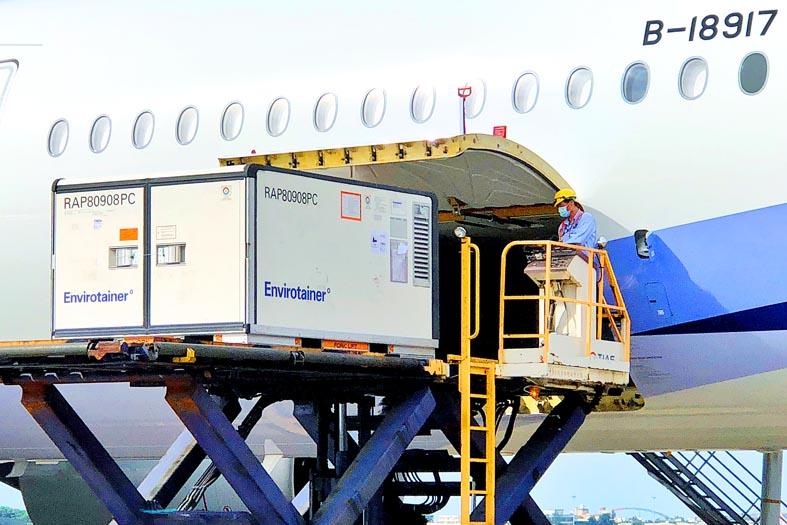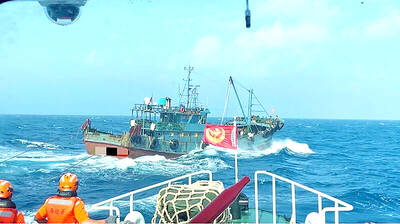Another 524,800 doses of the AstraZeneca COVID-19 vaccine arrived in Taiwan yesterday, as the nation’s vaccination rate for those having received their first dose reached 37.78 percent.
The batch was transported on a China Airlines Ltd (中華航空) flight from Bangkok that landed at Taiwan Taoyuan International Airport at about 3:25pm.
The delivery was the fifth batch of doses that the nation received as part of a contract for 10 million doses signed with AstraZeneca PLC on Oct. 30 last year, the Central Epidemic Command Center said.

Photo: CNA
The first batch of 117,000 doses was delivered on March 3, followed by 626,000 doses on July 7, 560,000 doses on July 15 and 582,000 doses on July 27, it said.
Yesterday’s shipment, which brought the total delivered so far under the contract to about 2.41 million, is to expire on Dec. 31, the center said.
They would be offered through the national COVID-19 vaccination program after the Food and Drug Administration completes its lot release testing, the center said.
On Wednesday, the nation administered 163,459 COVID-19 vaccine doses, bringing the total to 9,433,236 doses — 8,867,289 first doses and 565,947 second doses, the center said.
The total equates to a first-dose vaccination rate of 37.78 percent, or 40.19 doses administered per 100 people.
While only COVID-19 vaccines developed by AstraZeneca and Moderna have been administered in Taiwan so far, the nation expects to begin administering the COVID-19 vaccine manufactured by local drugmaker Medigen Vaccine Biologics Corp (高端疫苗) on Aug. 23.
On Tuesday, referring to the US’ donation of vaccine doses to Taiwan, US Senator Tammy Duckworth told an online event held by the Washington-based Center for Strategic and International Studies that “even though it was just 750,000 initially, the first tranche, we’re now well over 4 million vaccines to Taiwan.”
Her comment led people to speculate that the US might donate additional COVID-19 vaccine doses to Taiwan, as Washington sent 2.5 million Moderna doses in June.
After Duckworth had announced during a brief visit to Taipei that same month with US senators Dan Sullivan and Chris Coons that the US had pledged to donate 750,000 doses to Taiwan, the figure was increased by 1.75 million doses.
However, the Central News Agency cited an anonymous source as saying that the US had no plan to donate more doses to Taiwan, and that Duckworth likely misspoke.
Department of North American Affairs Deputy Director-General Regine Chen (陳慧蓁) told a news conference yesterday that the Taipei Economic and Cultural Representative Office in the US had confirmed with Washington that there is no information on further donations.

MILITARY BOOST: The procurement was planned after Washington recommended that Taiwan increase its stock of air defense missiles, a defense official said yesterday Taiwan is planning to order an additional four PAC-3 MSE systems and up to 500 missiles in response to an increasing number of missile sites on China’s east coast, a defense official said yesterday. The official, who spoke on condition of anonymity, said that the proposed order would be placed using the defense procurement special budget, adding that about NT$1 trillion (US$32,88 billion) has been allocated for the budget. The proposed acquisition would include launchers, missiles, and a lower tier air and missile defense radar system, they said The procurement was planned after the US military recommended that Taiwan increase

POLITICAL AGENDA: Beijing’s cross-strait Mid-Autumn Festival events are part of a ‘cultural united front’ aimed at promoting unification with Taiwan, academics said Local authorities in China have been inviting Taiwanese to participate in cross-strait Mid-Autumn Festival celebrations centered around ideals of “family and nation,” a move Taiwanese academics said politicizes the holiday to promote the idea of “one family” across the Taiwan Strait. Sources said that China’s Fujian Provincial Government is organizing about 20 cross-strait-themed events in cities including Quanzhou, Nanping, Sanming and Zhangzhou. In Zhangzhou, a festival scheduled for Wednesday is to showcase Minnan-language songs and budaixi (布袋戲) glove puppetry to highlight cultural similarities between Taiwan and the region. Elsewhere, Jiangsu Province is hosting more than 10 similar celebrations in Taizhou, Changzhou, Suzhou,

COGNITIVE WARFARE: Chinese fishing boats transmitting fake identification signals are meant to test Taiwan’s responses to different kinds of perceived incursions, a report said Chinese vessels are transmitting fake signals in Taiwan’s waters as a form of cognitive warfare, testing Taipei’s responses to various types of incursions, a report by the Institute for the Study of War said on Friday. Several Chinese fishing vessels transmitted fake automatic identification system (AIS) signals in Taiwan’s waters last month, with one mimicking a Russian warship and another impersonating a Chinese law enforcement vessel, the report said. Citing data from Starboard Maritime Intelligence, the report said that throughout August and last month, the Chinese fishing boat Minshiyu 06718 (閩獅漁06718) sailed through the Taiwan Strait while intermittently transmitting its own AIS

CHINESE INFILTRATION: Medical logistics is a lifeline during wartime and the reported CCP links of a major logistics company present a national security threat, an expert said The government would bolster its security check system to prevent China from infiltrating the nation’s medical cold chain, a national security official said yesterday. The official, who wished to stay anonymous, made the remarks after the Chinese-language magazine Mirror Media (鏡周刊) reported that Pharma Logistics (嘉里醫藥物流) is in charge of the medical logistics of about half of the nation’s major hospitals, including National Taiwan University Hospital and Taipei Veterans General Hospital. The company’s parent, Kerry TJ Logistics Co (嘉里大榮物流), is associated with the National Committee of the Chinese People’s Political Consultative Conference (CPPCC) and the Chinese People’s Liberation Army (PLA), the